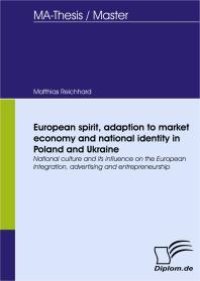
Ebook: European spirit, adaption to market economy and national identity in Poland and Ukraine : National culture and its influence on the European Integration, advertising and entrepreneurship
Author: Matthias Reichhard
- Tags: Nationalism -- Europe Eastern -- History., Europe Eastern -- Politics and government.
- Series: Diplomica
- Year: 2008
- Publisher: Diplomica Verlag
- City: Hamburg, GERMANY
- Edition: 1
- Language: English
- pdf
When at the turn of the 1980, the face of the political world was largely remodelled with the vanishment of classical East and West blocs, the economical wasteland created by the failed socialist planned economic system constituted a fascinating research pasture for economists of all disciplines - especially macroeconomists and specialists for economic politics. At universities, new faculties for transformation studies were created. Authors like Rodrick elucidated the reasons for the acute period of the COMECON alliance in form of teh Soviet trade shock, de Melo, van den Mortel a.o. discussed reasons for discrepancy of initial condions, Aghion & Blanchard about the speed of transition, just like Wyplosz, Fischer & Sahayestablished a balance sheet after a decade of transition. However, the preponderant part authorship dedicated to the fate and future of Central and Eastern European countries left apart a force of influence which disciplines of business adminitration have discovered for disciplines like management and staff motivation: culture. The author of the present study did extended research for working papers a.o. which may provide hints for characteristics of development visible in two exemplaric states, out of which one used to be part fo the soviet Union (Ukraine), the other a satellite "brother country" (POland), which lie below the surface of economic behaviour and performance. The result of this quest was y and large that there indeed do exist works which deal with the selected econo-political aspects; however, most authors refer to the five dimensions of national culture presented by Hofstede, which in the author`s opinion oversimplify the complex and difficultly obervable domain fo culture, sometimes even is entangled in contradictions like with the high masculinity/femininity index for Italy. This is why the author rather oriented by the need-belief-value-attitude continuum described by Culatta and thus developped his chapters on EU accession, advertisng creation and response as well as push and pull factors for business ownership and SME landscape departing from an own digest of cultural models by Trompenaars, Hall, Merk, throsby et. al., proceeding via approaches showing ellements of the N-B-V-A vchain more detailedly - e.g. Schwartz`s ten basic human values or Nussbaum`s capability theory- and applying those components to concrete manifestaions in the oberved countries, e.g. Dyczewski`´s compilation of Polish national values and Ray`s Ukrainian static and dynamic worldviews. Results of this study are in short that an economy`s national culture should not be left apart when it is about economic and political development and that for two of the three topics treated - national and European identity as well as entrepreneurship - huge diversions between Poland and Ukraine were stated (strong idea of Polishdom and Poland`s reserved place in the EU vs. Ukrainian roots blurred a.o. by Russian, German and Communist influences; optimist Polish business owners, often supported by their faith in God vs. resignated entrepreneurs stuck in dirty business rules in Ukraine) whereas the assessment of advertising found about the same level of human needs suppressed before 1991 and satisfied afterwards. Apart of its function as graduation, this work`s reason for existence is to animate fellow-researchers to undertake primary research based on more inspiring and substantial theoretical beckgrounf than the Hofstedian model and to consider other facets of CEEC integration into the EU, e.g. microcultures like religion, residence status or communicative topics like negotiation style and reasons for failure. Biographische Informationen Matthias Reichhard, Diplomkaufmann, Studium der Betriebswirtschaft an der TU Bergakademie Freiberg und der Pozan Academy of Economics; Abschluss des Doppeldiplomprogramms im Februar 2008. Derzeit tätig als Praktikant in der Abteilung Internationaler Vertrieb bei Skoda Auto in Mlada Boleslav/Tschechien.
Download the book European spirit, adaption to market economy and national identity in Poland and Ukraine : National culture and its influence on the European Integration, advertising and entrepreneurship for free or read online
Continue reading on any device:

Last viewed books
Related books
{related-news}
Comments (0)